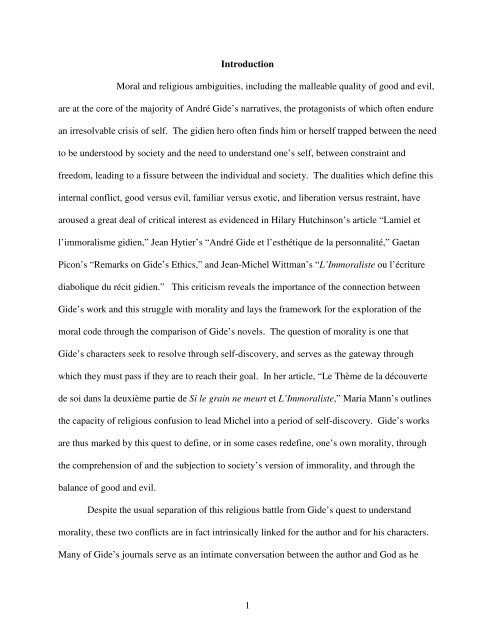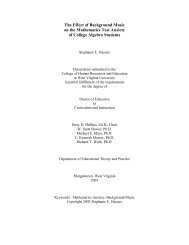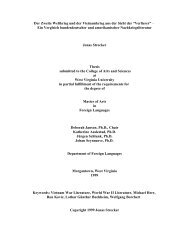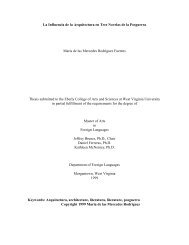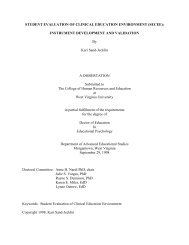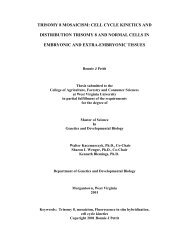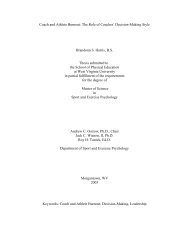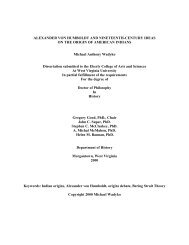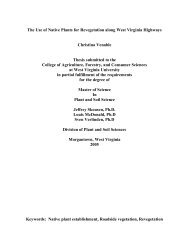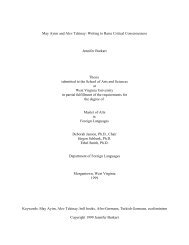Parallel Structures and Binary Oppositions in André Gide's L ...
Parallel Structures and Binary Oppositions in André Gide's L ...
Parallel Structures and Binary Oppositions in André Gide's L ...
Create successful ePaper yourself
Turn your PDF publications into a flip-book with our unique Google optimized e-Paper software.
Introduction<br />
Moral <strong>and</strong> religious ambiguities, <strong>in</strong>clud<strong>in</strong>g the malleable quality of good <strong>and</strong> evil,<br />
are at the core of the majority of <strong>André</strong> Gide’s narratives, the protagonists of which often endure<br />
an irresolvable crisis of self. The gidien hero often f<strong>in</strong>ds him or herself trapped between the need<br />
to be understood by society <strong>and</strong> the need to underst<strong>and</strong> one’s self, between constra<strong>in</strong>t <strong>and</strong><br />
freedom, lead<strong>in</strong>g to a fissure between the <strong>in</strong>dividual <strong>and</strong> society. The dualities which def<strong>in</strong>e this<br />
<strong>in</strong>ternal conflict, good versus evil, familiar versus exotic, <strong>and</strong> liberation versus restra<strong>in</strong>t, have<br />
aroused a great deal of critical <strong>in</strong>terest as evidenced <strong>in</strong> Hilary Hutch<strong>in</strong>son’s article “Lamiel et<br />
l’immoralisme gidien,” Jean Hytier’s “<strong>André</strong> Gide et l’esthétique de la personnalité,” Gaetan<br />
Picon’s “Remarks on Gide’s Ethics,” <strong>and</strong> Jean-Michel Wittman’s “L’Immoraliste ou l’écriture<br />
diabolique du récit gidien.” This criticism reveals the importance of the connection between<br />
Gide’s work <strong>and</strong> this struggle with morality <strong>and</strong> lays the framework for the exploration of the<br />
moral code through the comparison of Gide’s novels. The question of morality is one that<br />
Gide’s characters seek to resolve through self-discovery, <strong>and</strong> serves as the gateway through<br />
which they must pass if they are to reach their goal. In her article, “Le Thème de la découverte<br />
de soi dans la deuxième partie de Si le gra<strong>in</strong> ne meurt et L’Immoraliste,” Maria Mann’s outl<strong>in</strong>es<br />
the capacity of religious confusion to lead Michel <strong>in</strong>to a period of self-discovery. Gide’s works<br />
are thus marked by this quest to def<strong>in</strong>e, or <strong>in</strong> some cases redef<strong>in</strong>e, one’s own morality, through<br />
the comprehension of <strong>and</strong> the subjection to society’s version of immorality, <strong>and</strong> through the<br />
balance of good <strong>and</strong> evil.<br />
Despite the usual separation of this religious battle from Gide’s quest to underst<strong>and</strong><br />
morality, these two conflicts are <strong>in</strong> fact <strong>in</strong>tr<strong>in</strong>sically l<strong>in</strong>ked for the author <strong>and</strong> for his characters.<br />
Many of Gide’s journals serve as an <strong>in</strong>timate conversation between the author <strong>and</strong> God as he<br />
1


